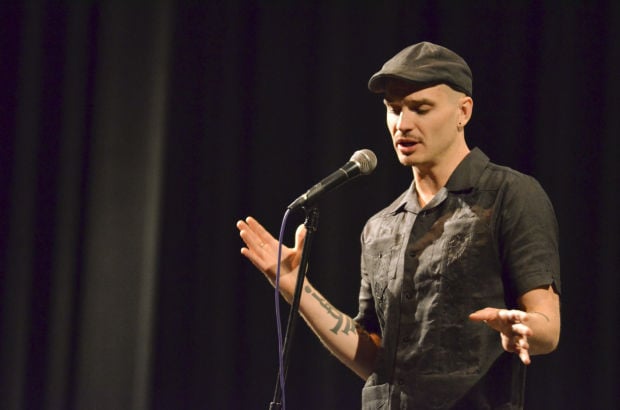The words, each one selected for a purpose and effect, erupt in staccato rhythm or they bend slowly. The words create images, both vivid and real, or sublime and surreal, taking the listener on a journey.
When poet/performer/DJ Logan “Dirtyverbs” Phillips recites his bilingual poems, it is a journey that he wants his audience to take with him. Especially young people, who Phillips has worked with as an educator and poet activist through the Tucson Youth Poetry Slam events.
April is national poetry month and this past weekend the Tucson Poetry Festival celebrated three days of poetry. But for Phillips and many others, poetry is celebrated every day. And if it isn’t, well, it should be.
“Poetry moves entire rooms when it’s performed well. Poetry moves culture and society forward,” said Phillips in a Friday morning conversation in his Barrio Viejo home.
Poetry is everywhere. We see it in the brilliant early morning light, in the riot of colors at sunset and in sprouting ocotillos and palo verdes. We hear poetry in the drone of downtown traffic, in the voices of children playing in the park and in the near silence of the wind ruffling the trees’ branches and leaves.
We live with poetry surrounding us yet we fail to recognize its beauty and celebrate its power. Phillips is trying to change that through Spoken Futures, a youth-oriented poetry and community engagement organization he co-directs with Sarah Gonzales.
Phillips and Gonzales take poetry into the schools and into the community. The slam, where the poetry is performed rap-like, is one of their highlights.
Since the local slam’s inception in late 2010, young poets gather monthly at Bentley’s House of Coffee and Tea, on East Speedway near North Campbell Avenue, to recite their poetry. Phillips said the monthly gathering attracts students from virtually all of Tucson’s high schools. It’s a competition that leads to an annual poetry slam contest, which will be held April 26 at the University of Arizona.
But the slams are more than contests for the poets, Phillips said.
“It’s not about what school they’re from. Its about what words they bring to the conversation,” he added.
Phillips entered that conversation while in high school in Sierra Vista. He doodled images and wrote verses in small books that he still has.
He was alone, however. Writing poetry was not appreciated and was put down by his classmates.
It was at Northern Arizona University where Phillips encountered his community of poets, through poetry slam contests. He discovered the power of language and he delved into poetry.
And he began to explore poetry in two languages, English and Spanish, which he weaves seamlessly in his work. Phillips lived for several years in Mexico before returning to Arizona to begin working as an educator and activist.
Social and cultural issues figure strongly in his work. Liberation Lyrics is a second component to Spoken Futures. Phillips uses language and poetry to help students understand the economic and social forces that shape their neighborhoods and lives.
His other work includes a performance poetry group called Verbobalas and in 2009 he published “Arroyo Ink,” a collection of poetry and images with Adam Cooper-Terán. Phillips hopes to publish a new collection, “Sonoran Strange.”
In addition to his poetry and teaching, Phillips, who turns 31 Monday, is a well-known nightclub Latin music DJ. That’s where he earns much of his income. But in mixing music, Phillips creates poetry as well.





